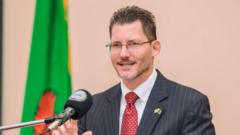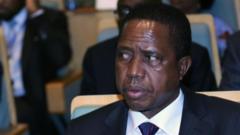The US has announced the suspension of $50 million in aid to Zambia's health sector, citing the country's ongoing issues with the theft of donated medical supplies, a decision that raises serious concerns for public health.
US Cuts $50 Million Aid to Zambia Over Ongoing Medicine Theft

US Cuts $50 Million Aid to Zambia Over Ongoing Medicine Theft
The US halts significant financial support due to Zambia's failure to tackle systemic drug theft.
The US government's recent decision to cut $50 million in aid to Zambia's health sector has drawn attention due to the alarming context of the action: rampant theft of donated pharmaceuticals and medical supplies. US Ambassador to Zambia, Michael Gonzales, expressed that this "difficult" move was essential after multiple alerts had been disregarded by the Zambian government regarding the issue of systemic misappropriation of essential medications meant for the country’s most vulnerable populations.
Gonzales stated, “We are no longer willing to underwrite the personal enrichment of fraudsters or the corrupt when patients go without or have to buy life-saving medications that we have provided for free." He emphasized the urgency of the situation, especially given that the US constitutes a substantial portion of Zambia's public health funding.
Investigations conducted by US officials exposed troubling findings: over 2,000 pharmacies were reportedly discovered selling donated health products, with an astounding 95% of those pharmacies involved in the sale of stolen goods, comprising 50% of the medications visited during examinations. The US embassy had laid out these findings, along with offers for expert assistance, to halt such thievery last year, yet Zambia took no action.
The Zambian government's measure of focusing on lower-tier offenders resulted in only a handful of mid-level officials being apprehended, raising concerns over a broader commitment to tackle the underlying issues within the system. Gonzales stressed that the US could “no longer justify” to taxpayers the continuation of extensive aid while such malfeasance persists. He noted that the cuts would have repercussions for critical treatments for diseases such as malaria, HIV, and tuberculosis.
With the aid cuts set to take effect in January, Gonzales expressed regret for potential impacts on Zambian patients, hinting that the Zambian government would be allowed some time to establish alternative arrangements.
This suspension of funds comes in the wake of a broader aid freeze initiated by former President Donald Trump, a move to reduce global health program budgets that has had detrimental effects across several African nations struggling with health crises. A stark reminder of the geopolitical complexities at play, Zambia's President Hakainde Hichilema remarked earlier this year on the adverse impacts of US policy, emphasizing the need for the country to bolster its financial capabilities to secure necessary medicines independently.
Gonzales stated, “We are no longer willing to underwrite the personal enrichment of fraudsters or the corrupt when patients go without or have to buy life-saving medications that we have provided for free." He emphasized the urgency of the situation, especially given that the US constitutes a substantial portion of Zambia's public health funding.
Investigations conducted by US officials exposed troubling findings: over 2,000 pharmacies were reportedly discovered selling donated health products, with an astounding 95% of those pharmacies involved in the sale of stolen goods, comprising 50% of the medications visited during examinations. The US embassy had laid out these findings, along with offers for expert assistance, to halt such thievery last year, yet Zambia took no action.
The Zambian government's measure of focusing on lower-tier offenders resulted in only a handful of mid-level officials being apprehended, raising concerns over a broader commitment to tackle the underlying issues within the system. Gonzales stressed that the US could “no longer justify” to taxpayers the continuation of extensive aid while such malfeasance persists. He noted that the cuts would have repercussions for critical treatments for diseases such as malaria, HIV, and tuberculosis.
With the aid cuts set to take effect in January, Gonzales expressed regret for potential impacts on Zambian patients, hinting that the Zambian government would be allowed some time to establish alternative arrangements.
This suspension of funds comes in the wake of a broader aid freeze initiated by former President Donald Trump, a move to reduce global health program budgets that has had detrimental effects across several African nations struggling with health crises. A stark reminder of the geopolitical complexities at play, Zambia's President Hakainde Hichilema remarked earlier this year on the adverse impacts of US policy, emphasizing the need for the country to bolster its financial capabilities to secure necessary medicines independently.




















